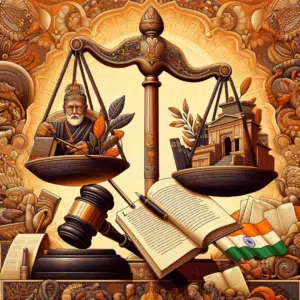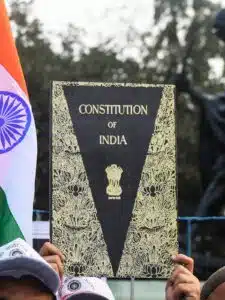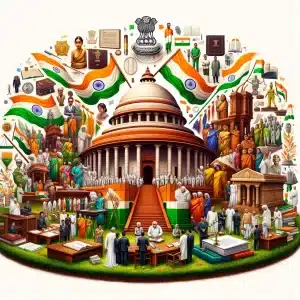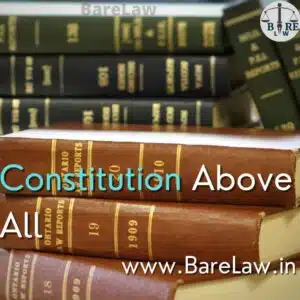India became a republic when its constitution came into force on 26th January 1950, it was also when the office of President came into existence. Under the draft constitution, the position of the President is similar to the position of the king under the English constitution. He is the head and representative of the nation but not an executive or ruling person. His primary duty is to preserve the law of India. According to article 56 (1) of the Constitution of India, the President of India shall hold office for a term of five years. The President is obliged to ensure that every state’s governance works according to the provisions of articles 355 and 356.
Article 58 of the Constitution of India lays down certain criteria for the President of India to obtain the office-
The necessary qualifications for a candidate to be elected as a President in India are-
- He should be a citizen of our nation.
- He should have attained minimum of 35years of age.
- He should qualify the necessary conditions to be a Lok Sabha member.
- He must not hold any office of profit under the state or central government or any public authority. (Article 59)
Article 57 provides that a former president shall, subject to certain provisions can be re-elected to that office.
Election of a President
Article 62 of the Constitution of India provides that the election to fill the vacant office of the President shall be held before the expiration of the term of office of the previous president.
Article 56(1)(c) provides that the president shall continue to hold the office until the new president enters is appointed.
There is no direct election for the post of President in India. He is elected by an
Electoral college comprising of Lok Sabha and Rajya Sabha, State Legislative Assemblies and the
Legislative Assemblies of Puducherry and Delhi.
Who is not a part of electing a President?
According to article 59 of the constitution, members of State Legislative Assemblies, union territories of Delhi and Puducherry, and the members of Legislative Councils in bicameral legislatures (Both elected and nominated) are not involved in the process. Article 71 (3) of the constitution lays down the rules to resolve the disputes that arise during the election of a President.
Process of electing a President-
The electoral college elects the president in a single transferable vote system by secret ballot. The vote of an MLA is calculated by a formula. The candidate who reaches or exceeds the winning quota is the winner.
Voter’s preference-
The vote is cast in favor of his first preferred candidate. If the first preference candidate is not able to reach the winning quota it is transferred to the second preference.
Article 60 of the constitution of India provides the oath which the president is required to make in the presence of the Chief Justice or the senior-most judge of the supreme court in case the Chief justice isn’t present. According to Article 71(1), the president can be removed for committing electoral malpractices or ceasing to possess the President’s requisite qualifications.
VICE PRESIDENT
After the constitutional law office of the President, the second-highest office belongs to the vice president in India who acts in the absence of the president as the President. The manner of the election of the vice president of India is stated in article 66 of the Constitution of India i.e. by means of the Single transferable vote conducted by the election commission by a secret ballot system. The electoral college consists of the members of the Lok Sabha and the Rajya Sabha. Part V, Chapter I of the Constitution of India deals with the office of the Vice-President.
Election process
Article 66 of the constitution provides that the election commission of India conducts the election. The electoral college consisting of the members of both the houses of the Parliament elects the vice President indirectly by means of a single transferable vote by secret ballot.
Not more than 60 days should pass after the vacation of the office.
Article 71(3) of the constitution deals with the rules regarding the disputes arising out of the election. The Supreme Court shall inquire into the disputes arising out of the election.
Article 69 of the Constitution of India provides the oath which the vice president is required to take.
Qualifications
63-73 which deal with the qualifications which are necessary for the candidature of the vice president of India-
- He should be a citizen of our nation.
- He should have attained minimum of 35years of age.
- He should qualify the necessary conditions to be a Lok Sabha member.
- He must not hold any office of profit under the state or central government or any public authority.
According to section 64, the vice president shall be ex-officio Chairman of the Council of States and shall not be entitled to the salary of the Chairman of the Council of States for the time being. (Article 97).
Term.
Article 65 states that the vice president shall discharge the functions of the President in his absence and
The vice president is entitled to hold the office for five years and can be re-elected.
Removal
Article 71(1) of the constitution, the vice president can be removed for committing electoral malpractices or ceasing to possess the President’s requisite qualifications.
You may also like to read:
-
05 Jul 2021 OpinionMaratha Reservation: From Legislature of Precedent
-
16 Aug 2021 Know Your LawThe preamble to the Constitution of India
-
19 Aug 2021 Know Your LawCitizenship laws in India
-
24 Aug 2021 Know Your LawOther authorities under article "12" of Constitution of India
-
06 Aug 2021 Case BriefsCase Brief of Justice K.S.Puttaswamy (Retired). V. Union of India and Ors, 2017 (Right to Privacy - A Grandstand View)
-
12 Sep 2021 Know Your LawConstitution above all









